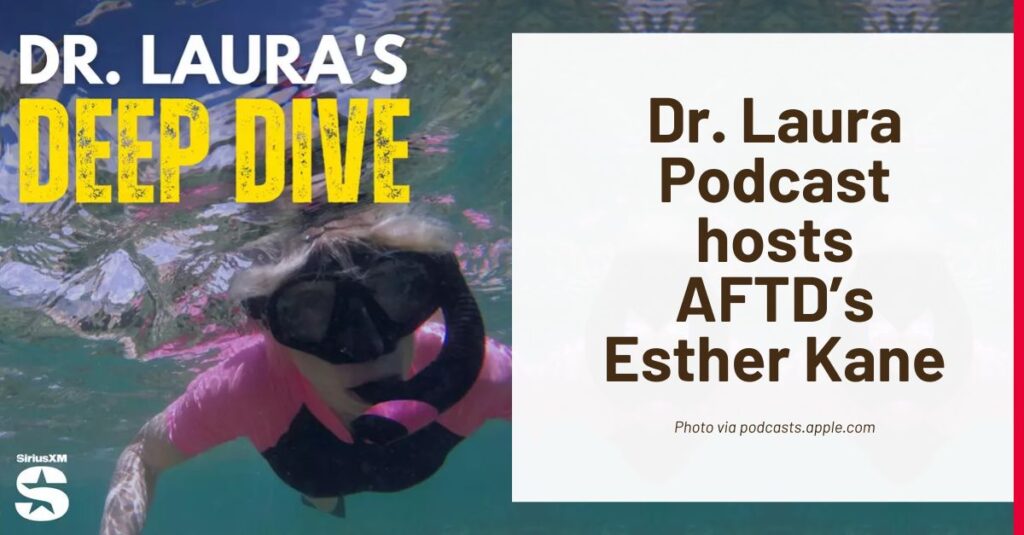Dr. Laura Podcast Hosts AFTD’s Esther Kane

AFTD Director of Support and Education Esther Kane, MSN, RN-CDP, joined Dr. Laura Schlesinger this week on her podcast, Dr. Laura’s Deep Dive.
Kane provided context and background on FTD alongside another guest, Sue Freund, an AFTD volunteer, whose husband, Billy, had FTD and passed away earlier this year at age 58.
Freund recalled thinking, eight years ago, something had changed about her gregarious, loving husband of 22 years: “I just started noticing these subtle changes in his behavior. And I wrote some of the stuff down because when it’s happening, none of it seems like a lot. It just seems like all little things, then all of a sudden the love of your life has become this stranger.”
She described an increasingly self-absorbed man, driving compulsively around the neighborhood playing loud music and singing. He complained of depression; he began to display a lack of empathy. He stopped washing his clothes. “Things that he used to do, like tell me I was pretty—those things went away,” said Freund. “One day he came home and he said, you know, you’re not fat like your friends. That was just something Billy would have never said.”
Freund thought he might be having an affair, or at least a significant midlife crisis. It took the perspective of her parents, after the two couples traveled together, to suggest this might not be psychological. “They hadn’t been with us in a while, and they said, ‘He’s a shell of himself. This is not the same man.’” A doctor friend suggested testing for FTD, and another suggested visiting the AFTD website.
“I started to read everybody’s story on the AFTD website. And before he even got officially diagnosed, I knew from reading the stories—oh my God, this is what he has. Who’s ever thinking of dementia at 50 years old?”
She eventually got an appointment to test him, beginning with an executive functioning assessment. “When I saw how little he could actually do, I was completely in shock because this was a man who still had a career. [He couldn’t] pick the animals out.”
Eventually Billy was diagnosed, and the doctor explained that he would never know he had FTD. “To the day he died, he thought he was working,” said Freund.
A Sadly Common Story
Freund’s journey was a familiar one to AFTD’s Kane. “What Sue’s talking about is a symptom called anosognosia, or sometimes we call it lack of insight. The symptoms of FTD can lead to this inability to understand what’s happening to you or that you have something changing. The main symptoms of the disease—loss of empathy, executive dysfunction, disinhibition, all kind of mix together. This can be extremely difficult for families to face.”
Dr. Laura relayed a question from a listener with multiple family members diagnosed with FTD. While familial FTD comprises about 40% of diagnosed cases, Kane noted the best course is to get genetic counseling if you have questions or concerns.
“Learn, talk, understand what’s happening in the disease, understand what’s happening with the genes,” said Kane. But she cautioned against assuming a genetic cause, because even with a family history of FTD, genetic testing can rule out FTD caused by a gene.
For those who do find a genetic cause, Kane pointed out that lifestyle factors have a big impact in improving people’s quality of life and can delay the onset of the disease. Exercise, eating a heart-healthy diet, limiting alcohol content, limiting sugar content and processed foods, all can have a positive benefit on our brain health, she noted.
AFTD: A Community to Stave Off Isolation
Caregiver isolation, said Kane, can be the hardest part of this disease. “One, you’re losing a person you love and you’re deeply invested in. But then on top of that, you’re alone. And when friends and family pull away, when your community pulls away, there’s a sense that you’re drowning. And so, I think more than anything, AFTD offers a community that says, we’re going to put out our hand and we’re going to hold your hand.”
Kane described how that happens. “AFTD has a group of Ambassadors and support group volunteers or other people impacted who just come together and say, ‘We’re gonna do this journey together.’” She pointed to AFTD’s HelpLine and other resources for both the newly diagnosed and those well into their FTD journey.
“The biggest thing that you can do, if you have a friend with FTD right now, if you have a family member—don’t pull away, lean in. Go in, help them, show up with cake, show up with flowers, show up and just say ‘we’re here’ and be present.
“We were made for other people. And when you’re isolated and alone and have already lost so much, we can stop that.”
By Category
Our Newsletters
Stay Informed
Sign up now and stay on top of the latest with our newsletter, event alerts, and more…

